Egypt's jailing of three journalists for seven years on bogus charges has been called "farcical," "draconian," etc. An exact parallel exists in the US, where PRSA bars reporters on inane charges.
One of the three Al Jazeera journalists, Baher Mohamed, got an extra three years because he had a spent bullet in his pocket picked up as a souvenir. This became "possession of a weapon."
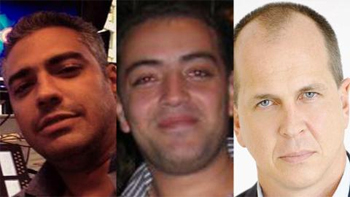 Photos: Al Jazeera |
The three Al Jazeera reporters were accused of creating street disturbances for their news reports at a time when such disturbances were widespread. There was no need for journalists to create their own demonstrations.
Peter Greste, an Australian, had only been in Egypt a few days when he was arrested. Mohamed Fahmy, a Canadian citizen of Egyptian descent, had reported for CNN, Los Angeles Times and New York Times. The three have been in Egypt's "notorious" Tora Prison since last December.
The "evidence" presented by prosecutors was taken from computers of the defendants. It consisted of shots of Greste's family on vacation, horses grazing in a pasture, and a news conference by Kenyan police that Greste had covered.
"There was no incriminating evidence," said Canadian Ambassador David Drake. No evidence at all was supplied to support the charges, said the NYT. Al Jeezera said the jailings defied "logic, sense and any sense of justice."
Similarly, PRSA has no evidence against us except grotesque distortions of our behavior. For instance, we're accused of "harassing" students by offering them $200 to cover a luncheon visit of 2009 chair Mike Cherenson in Akron.
All such farcical charges against us were rebutted in five pages in the May O'Dwyer's magazine.
Kerry Protests, But Delivers $$ to Egypt
What gave this story double meaning to us was that Secretary of State John Kerry, while saying of the jailings that "Injustices like this simply cannot stand," nevertheless on June 22 said the U.S. would fully restore the first $650 million of its $1.3 billion in annual aid to Egypt -- including 10 Apache attack helicopters.
The parallel that exists with the PR Society is that although it has blatant anti-press policies and practices, tramples on the rights of members, committed massive theft of copyrighted materials for 18 years, and is controlled by a small group of APRs who defy democratic procedures, it receives support from the AP, Cision, Vocus, PR Newswire, BusinessWire and other major PR players who simply hold their noses and look the other way.
The five entities named above are "gold," $20,000 sponsors of the 2014 annual conference of the Society Oct. 11-14 in Washington, D.C., the seat of our democracy.
We're astounded that AP is in this group but also note that it is headed by Gary Pruitt, a lawyer, who as far as we can see is an administrator who never wrote a story.
Simple Answer for Both: Withhold $$
President Obama and Kerry, while protesting the jailing of the journalists, Kerry making an "immediate" call to the Egyptian foreign minister, could rescue them by saying, "You won't get another penny until you free the journalists."
Rep. Adam Schiff (D-Calif.) proposed to cut aid to Egypt on June 24 after the jailings were announced but the House Appropriations committee rebuffed him 35-11.
Politics is at work. The U.S. feels the Egyptian government headed by Abdel Fattah el-Sisi is more supportive of U.S. aims in the Mid-East than the government of Mohamed Morsi’s Muslim Brotherhood. So the journalists are “thrown under a bus.” Who cares about them?
Sponsors Could Straighten Out PR Society
Major sponsors, who are hoping Society members will buy their products, could bring needed reforms to PRSA if they put such considerations aside and used their clout in service of ethics. While politicians such as Kerry mouth meaningless phrases that are not backed by action, the practice in PR is to remain silent -- lips buttoned -- and pretend lack of knowledge of any "hot" topic.
That's pretty hard to do for the five companies because they all subscribe to O’Dwyer media or are sent related articles if they don’t. Their silence is deafening.
A new figure has appeared on the horizon who offers some hope that justice might take place -- Howard Schultz, CEO of Starbucks, one of three "Most Ethical Retailers" in the U.S., according to Ethisphere Institute.
Starbucks has a warm, responsive and open culture. It encourages debate and discussion in its facilities. VP-CC James Olson is co-chair of the Society's national conference in D.C. Oct. 11-14.
The PR Society presents a harsh, unyielding face to its members and the press. It cuts off members from its website without a hearing or chance of appeal. Two pages were given in the 1980s and 90s membership books to hearings of charges by Judicial Panels and the board should any member be accused of anything.
Debate is stifled at the Society. Teleconferences are typically one-way only -- leaders and staff speaking. The entire morning of Assemblies is given to leader/staff speeches. The bar against reporters joining is selectively enforced because Fortune columnist Gil Schwartz, who is also a CBS PR executive, has been a member many years.
PRSA Elections Shun Democratic Process
The Society's election process is the opposite of what goes on in a democracy. Candidates vow to help the Society grow and be more diversified but duck all the major issues. They don't answer questions of members or the press.
Mark McClennan of MSLGroup, Waltham, Mass., candidate for chair-elect, promises to help the Society to grow and be more diverse. He describes himself as a "relentless advocate for measurement" who supports technology and training for it.
Blake Lewis, of his own firm in Dallas, says he will create a "strong" committee to seek new members, increase member satisfaction and mentor new professionals.
Lewis cannot possibly be chair-elect. That would mean another chair from the South after Kathy Barbour of Florida was chair. Mickey Nall of Atlanta was 2013 chair, Rosanna Fiske of Florida was 2011 chair and Gary McCormick of Knoxville was 2010 chair.
Lewis served as “fodder” for Barbour last year when he was her opponent for chair-elect. After three male chairs in a row (Cohen, Nall and Jerry Corbett), only a woman could have been picked as 2014 chair-elect.
There are again no candidates for the S.W. and S.E. Districts. There are only supposed to be two at-large directors, not five. Five are seeking to be at-large directors on the 2015 board and four of them are from the South: Jenifer Daniels of Charlotte, N.C.; Janice Luongo of Tampa; Dan McFadden of Little Rock, and Garland Stansell of Birmingham.
Twelve of the 17 members of the nomcom are APR when no more than four should be to reflect the fact that only 18% of members are APR. Six are from the South.
Questions for Candidates
The following questions have been e-mailed to McClennan, Lewis and the 21 other candidates. Readers are also invited to answer them and e-mail or mail them to O'Dwyer offices.
-- Non-Accredited members should be allowed to run for national board and officer posts. This has been forbidden since the 1970s although currently only 18% of members are APR and new APRs are coming in at a rate that for the past ten years is half the rate for the previous ten.
( ) Yes ( ) No
-- Reporters should be allowed to join PRSA and have full access to financial reports. PR people are allowed to join all press clubs in the U.S. and IABC allows reporter members. The press needs financial information in order to report fully and accurately on the Society. Gil Schwartz, CBS PR executive, is also a well known journalist, writing for Fortune magazine. If he is allowed to be a member, so should any journalist. IABC allows journalist members.
( ) Yes ( ) No
-- The Society should post its annual report and IRS Form 990 on its website early in the year but no later than May 31 each year. This practice is recommended by the Independent Sector (500+ non-profits). At least half of dues income should be deferred to reflect services to be deiivered.
( ) Yes ( ) No
-- The Assembly should have downloadable, full copies of the 990 weeks before it meets. The 990 has not been made available until after the Assembly for the past four years.
( ) Yes ( ) No
--The Society, with about $5 million in cash and investments, should open a midtown New York facility for use by members, prospective member and the press. The New York chapter meets in various midtown bars since the downtown location of h.q. makes it too inconvenient to use.
( ) Yes ( ) No
-- The Society should provide an online directory of members that duplicates the former printed directory which was cancelled as of 2005. Reasons given were costs of printing, paper and postage. However, a PDF would shift all these costs to users. The PDF could easily be kept 100% up-to-date.
( ) Yes ( ) No
-- A list of all staff members including their titles, phones and e-mails should again appear on the Society website. Only eight names currently appear.
( ) Yes ( ) No
-- No member should lose any privileges without a hearing. A member recently was deprived of web access after being accused of forwarding Society finances to Jack O’Dwyer. The member did not do this. He only looked at the finances on the website. There was no hearing, no chance to present his side. He did not renew his membership. Non-members, including reporters, should also not be disciplined without a hearing. Member directories in the 1980s and 90s had two pages describing Judicial Panels that handled any charges against a member. Such due process should be returned to the Society.
( ) Yes ( ) No
-- The Assembly should elect its own officers just like lawyer, medical and accounting groups do and conduct its own meetings. Allowing staff and officers to monopolize the morning session with speeches followed by breaking up the Assembly into pieces for much of the afternoon should stop.
( ) Yes ( ) No
-- Non-APR members should be allowed to serve on the Board of Ethics and Professional Development. Only APRs may serve which implies that non-APRs are not as ethical as APRs.
( ) Yes ( ) No
-- The nominating committee should reflect the APR/non-APR proportion of members. The 2014 nomcom has 15 APRs and five non-APRs when the proportions should be reversed to reflect the 18% of members who are APR.
( ) Yes ( ) No


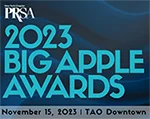 PRSA-NY today announced its five honorary co-chairs for its Big Apple Awards ceremony gala slated for TAO Downtown on Nov. 15.
PRSA-NY today announced its five honorary co-chairs for its Big Apple Awards ceremony gala slated for TAO Downtown on Nov. 15.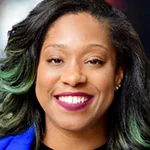 PRSA-NY president Carmella Glover today issued a "heartfelt apology" on behalf of the chapter for her Oct. 14 message that "caused disappointment and hurt to some of our valued members."
PRSA-NY president Carmella Glover today issued a "heartfelt apology" on behalf of the chapter for her Oct. 14 message that "caused disappointment and hurt to some of our valued members."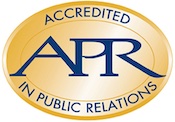 The leadership of Public Relations Society of America is backing a move to change the current “must-have” APR accreditation to “strongly preferred” as a requirement for a seat on its board of directors.
The leadership of Public Relations Society of America is backing a move to change the current “must-have” APR accreditation to “strongly preferred” as a requirement for a seat on its board of directors.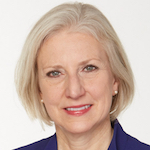 Public Relations Society of American today named Linda Thomas Brooks CEO, succeeding CFO Phil Bonaventura, interim chief since July 2019.
Public Relations Society of American today named Linda Thomas Brooks CEO, succeeding CFO Phil Bonaventura, interim chief since July 2019.


 Have a comment? Send it to
Have a comment? Send it to 
No comments have been submitted for this story yet.